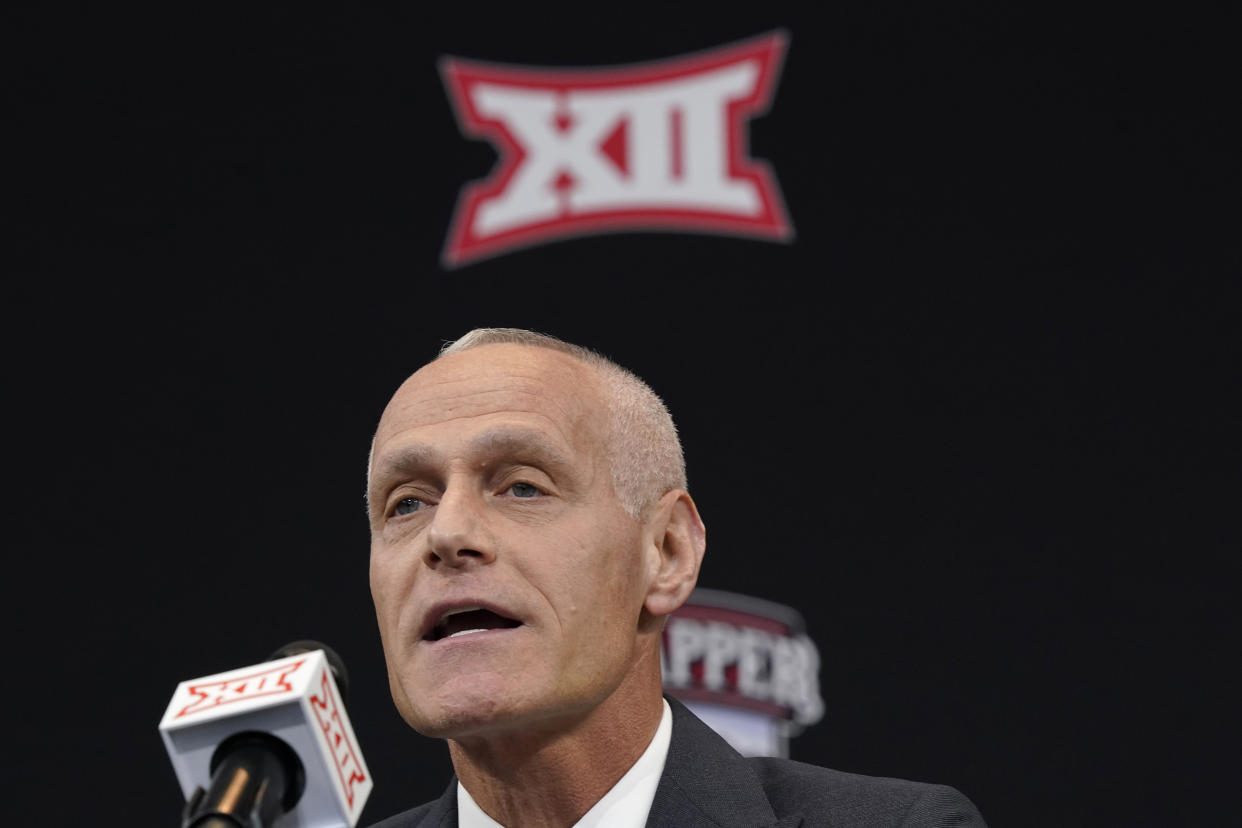Big 12 is now the hunter and the Pac-12 could be in its sights
A year ago, the Big 12 was pushed to the brink by the defections of Texas and Oklahoma to the SEC. The remaining eight schools were searching for stability. The Pac-12 could have come in and finished the place off with a few tactical expansion moves.
The future was as terrifying as it was uncertain.
Yet the league survived.
No one was poached. The Pac-12 didn’t call. Anger at the Longhorns and Sooners seemed to galvanize the programs left behind. With no other options, everyone pushed forward together, adding four promising schools (BYU, UCF, Cincinnati and Houston) and stretching its boundaries from the Rocky Mountains to Disney World.
No, the Big 12 is not the big-money Big Ten or SEC. It isn’t staring at extinction either, though.
Now it is the Pac-12 reeling from the losses of USC and UCLA to the Big Ten. And now it is the Big 12, playing from a position of unexpected strength, that can be the aggressor.
“We’re in a great place,” commissioner Brett Yormark said Wednesday. “The question is, ‘Where do we go next?’”
For Yormark, that is a legit question. He doesn’t know. He spoke Wednesday at Big 12 media days in Arlington, Texas, despite not officially taking over his new job until Aug. 1. He comes from an executive role at Jay Z’s entertainment agency Roc Nation and has previous stops in the NBA and NASCAR.
His newness to college athletics was obvious in some of the details he clearly didn’t understand or avoided in his answers. No matter, he can catch up on that.
The league needs a leader, a strategist, a visionary. Yormark may be just that.
This will be a trial by fire and nothing is more important for the Big 12 than finding as much revenue as possible to close the gap with the far wealthier SEC and Big Ten.
And nothing adds more value than possible expansion — which can drive up television, media and marketing rights.
“The Big 12 is open for business,” Yormark said.

Yormark said he has received plenty of calls, but he also repeatedly cautioned that any expansion has to be “additive and not dilutive.” That means if there is expansion, it will almost certainly focus on current Pac-12 schools.
The obvious candidates are Oregon, Washington, Arizona, Arizona State, Utah and Colorado (an old Big 8/12 mainstay). These are not only bigger brands, markets and fan bases that can add value to the Big 12’s upcoming media rights deals, but also decimate the Big 12’s most direct competitor for television network interest … the Pac-12.
Right now five major college rights deals are coming up in the next few years. The Big Ten is by far the most valuable. Then comes the Pac-12, Big 12, Notre Dame home games and eventually the College Football Playoff, which will exist in some form.
Maybe nothing generates more money for the Big 12 than taking the Pac-12 off the table as a viable entity … thus limiting supply to increase demand.
It’s cutthroat and non-congenial — and a bit depressing — but at this point it is also the reality of college athletics.
As Jay-Z might put it: Yormark is a businessman; he’s going to do business, man.
Would the Big 12 do it? Can it? Can it lure those six schools, or even a couple of them thus setting off a string of dominoes, by selling stability and commonality? Or can the Pac-12 regroup, hold off these Great Plains poachers, and stick together?
It is the latest in a slow-burning skirmish between these two conferences that dates back to 2011 when Pac-12 commissioner Larry Scott considered adding Texas, Texas Tech, Oklahoma and Oklahoma State.
Washington and Oregon are desperate to get to the Big Ten, per numerous sources in college athletics. However, right now — and this, like shifting tectonic plates, could change at any moment — the Big Ten isn’t expanding past 16 teams.
Does Arizona, Arizona State, Utah and Colorado want to hitch their conference membership to two schools who, if asked, would bail as soon as possible and return the Pac-12 to uncertainty?
Or would those four schools prefer to get with the Big 12 that wants and needs them while serving as geographic and football fits?
That’s the Big 12 sales pitch. To up the ante, would the Big 12 consider offering a deal to the six Pac-12 schools that they can exit the league early if the Big Ten actually comes calling? There might be some fee, of course, but it could be manageable. The Pac-12, which needs a long-term commitment, might not be able to match that.
Such a proposal might appeal to Washington and Oregon, who could continue to play big-time football but have an out if they ever get their dream date.
The Big 12 might seem desperate, but this is a risk assessment. The Big Ten might never come for Washington and Oregon and are even less likely to come for the other four schools.
In the short term — which is when the Big 12 needs to get as much media revenue as possible — it would bring in “additive” programs while also wiping out a competitor for television dollars.
“We will leave no stone unturned to drive value for the conference,” Yormark said, speaking in general. “Exploration and optionality is at the forefront of what we are focused on … Everything we do must create momentum for these [media rights] negotiations.”
Everything.
One year after being the hunted, the Big 12 is doing the hunting; this time with a new, potentially aggressive, boss at the helm.
